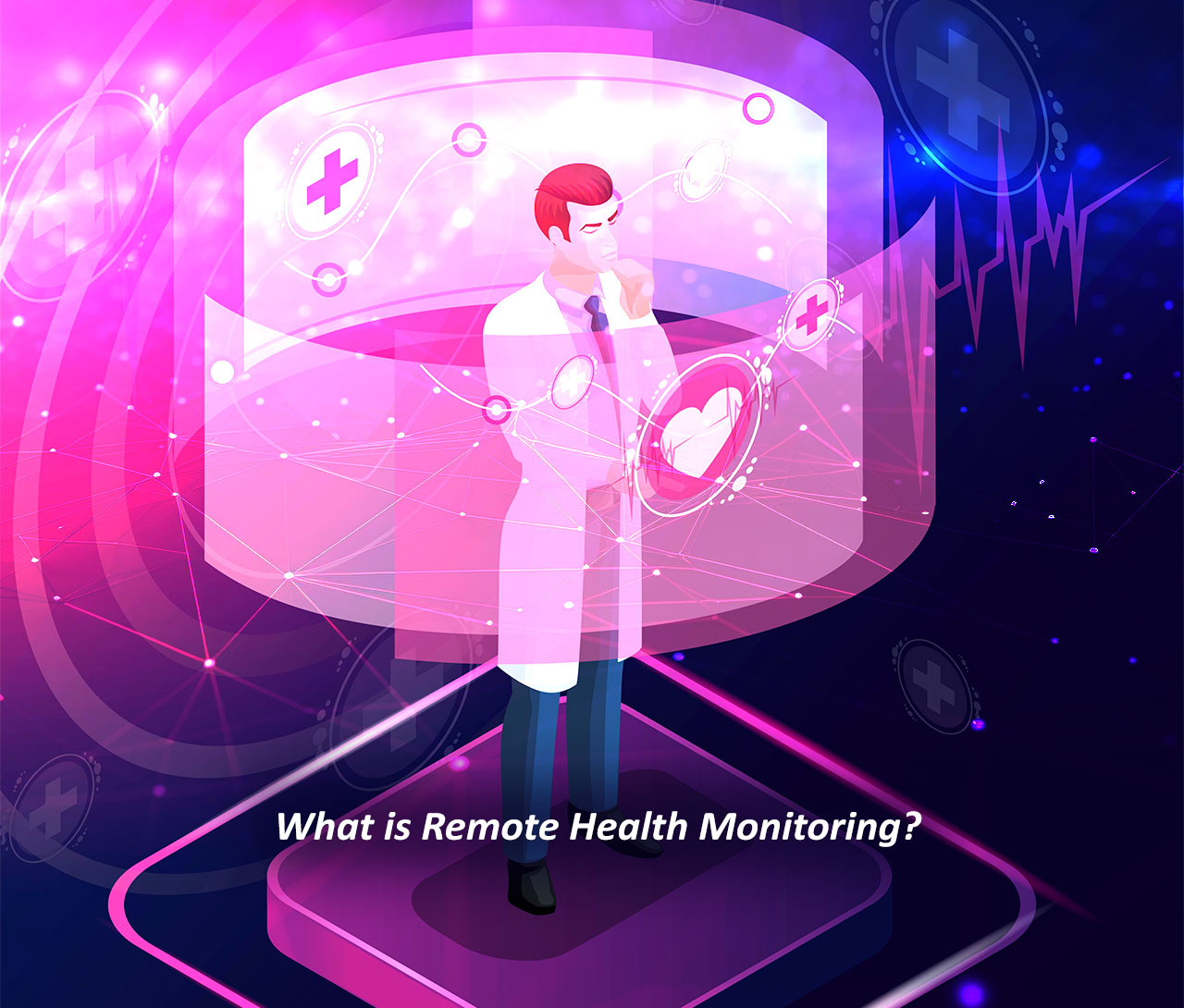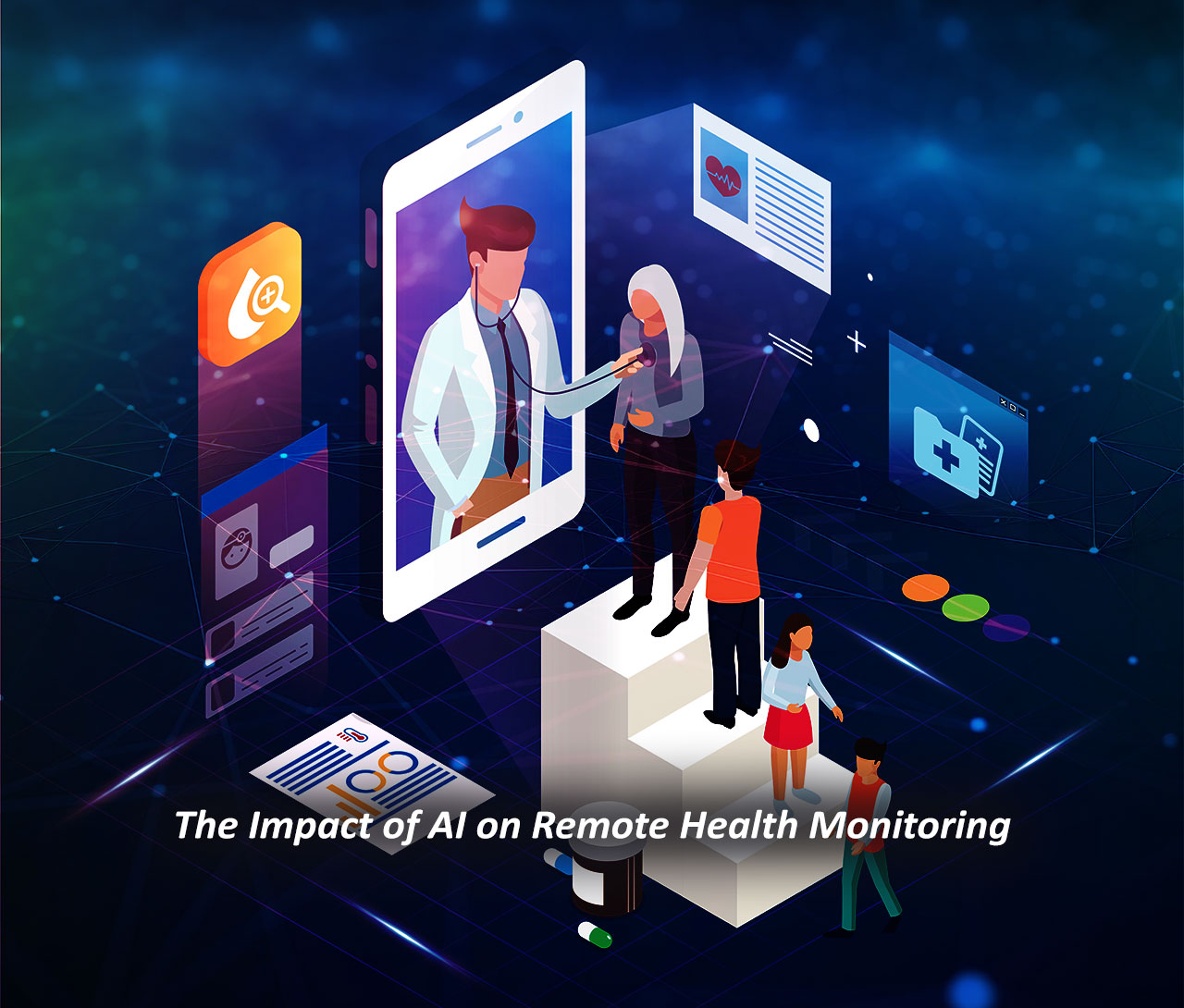The integration of artificial intelligence (AI) into healthcare, particularly in remote health monitoring (RHM), is revolutionizing patient care. In this comprehensive guide, we will explore the evolution of RHM, delve into key AI-driven use cases, examine the impact of AI for remote health monitoring, and discuss future trends shaping the landscape.
What is Remote Health Monitoring?
Remote health monitoring (RHM), which is commonly referred to as remote patient monitoring (RPM), utilizes technology to observe patients in non-clinical settings, such as their homes. This approach employs diverse devices and technologies to capture specific physiological data, transmitting this information wirelessly to both the patient and healthcare professionals. RHM facilitates the monitoring of patient health beyond conventional clinical environments, fostering a consistent connection between patients and caregivers, and offering healthcare providers a continuous flow of real-time health data. The incorporation of AI for remote health monitoring reflects a paradigm shift in healthcare practices, offering opportunities for more personalized and proactive care.
Government agencies have played a pivotal role in the transformation of healthcare, with the Centers for Medicare and Medicaid Services (CMS) being a significant influencer in setting care standards. Since 2018, CMS has introduced CPT codes for remote therapeutic monitoring (RTM), expanding to cover respiratory and musculoskeletal (MSK) conditions, including remote physical therapy and COPD inhaler monitoring by 2022. This development signifies a substantial stride in aiding patients to integrate their treatments effectively into their daily lives, recognizing that much of healthcare occurs outside sporadic clinical visits.
4 Key Use Cases of AI for Remote Health Monitoring
Now that you have a fair idea about RHM, let’s delve into its top use cases.
Use Case 1: Predictive Analytics for Early Intervention
In a major healthcare system, AI algorithms were employed to analyze historical patient data, including vital signs, medical history, and lifestyle factors. For instance, Benchmark Analytics, a key player in predictive analytics for early intervention, provides the “First Sign” solution. Leveraging evidence-based research, comprehensive information sources, and advanced analytics, this solution identifies individuals requiring intervention, with a focus on law enforcement. By detecting subtle patterns indicative of health deterioration, the AI system successfully predicted the onset of a cardiac event in a group of high-risk patients. This early detection allowed healthcare providers to intervene promptly, implementing personalized interventions such as medication adjustments and lifestyle recommendations. The result was a significant reduction in the number of emergency hospital admissions and improved long-term outcomes for the identified patients.
Use Case 2: Wearable Technology and Continuous Monitoring
Tyndall National Institute in Ireland, a renowned research institution, partnered with a tech company to deploy wearable devices equipped with advanced sensors for continuous patient monitoring. These wearables collected real-time data on heart rate, blood pressure, oxygen levels, and activity levels. AI algorithms processed this continuous stream of data, identifying irregularities in vital signs. In a specific case, the wearable detected an abnormal spike in heart rate and immediately alerted healthcare professionals. Further investigation revealed an arrhythmia that would have gone unnoticed without continuous monitoring. The patient received timely medical attention, preventing a potential cardiac event.
Use Case 3: AI-Enhanced Diagnostic Imaging
Siemens Healthineers is a leading medical imaging center that integrated AI into its diagnostic processes to improve the accuracy and efficiency of radiological assessments. AI algorithms were trained to analyze medical images, including X-rays and MRIs, to identify subtle anomalies indicative of early-stage diseases. In a notable case, an AI system detected a small but potentially cancerous lesion in a chest X-ray that had initially been overlooked by human radiologists. This early detection allowed for prompt intervention, significantly increasing the chances of successful treatment and recovery for the patient.
Use Case 4: AI for Remote Health Monitoring through Data Analytics
A large healthcare network utilized AI-driven data analytics to derive intelligent health insights from diverse patient datasets. By integrating electronic health records, genetic information, and lifestyle data, the AI system identified patterns associated with a specific chronic condition. In a practical scenario, this comprehensive analysis revealed a previously unrecognized link between a genetic predisposition and the development of diabetes. Armed with this insight, healthcare providers developed personalized prevention strategies, including tailored diet plans and monitoring protocols, resulting in improved management and prevention outcomes for at-risk patients.
The Impact of AI on Remote Health Monitoring
The integration of AI for remote health monitoring has proven instrumental in streamlining operations and optimizing resource allocation. From administrative tasks to clinical decision support, AI technologies enhance efficiency across the entire healthcare delivery spectrum. Automated processes, predictive modeling, and data-driven insights contribute to a more streamlined and cost-effective healthcare system, ultimately benefiting both healthcare providers and patients.
Addressing Concerns and Challenges in AI for Remote Health Monitoring
As AI becomes an integral part of remote health monitoring, addressing privacy and security concerns is of paramount importance. The vast amount of sensitive patient data processed by AI algorithms necessitates robust measures to safeguard against unauthorized access and data breaches. Striking the right balance between the benefits of AI for remote health monitoring and the protection of patient privacy requires the implementation of stringent security protocols, encryption standards, and ethical data handling practices.
The ethical considerations surrounding AI applications in healthcare demand careful attention. From ensuring transparency in algorithmic decision-making to preventing bias in AI-driven diagnostics, healthcare providers must adhere to ethical guidelines and industry standards. Regulatory frameworks play a crucial role in maintaining ethical standards, emphasizing the need for ongoing vigilance and responsible AI practices.
Future Trends and Innovations in AI-Driven Healthcare
The future of AI in remote health monitoring holds exciting possibilities with the emergence of cutting-edge technologies. From advancements in predictive analytics to the integration of AI with robotics and telemedicine, the healthcare landscape is poised to observe further transformation. The integration of AI with other healthcare technologies, such as the Internet of Things (IoT) and telemedicine, marks a shift toward a more interconnected healthcare ecosystem. The synergy between these technologies enables seamless data exchange, comprehensive patient monitoring, and more effective collaboration among healthcare professionals.
Final Takeaway
The adoption of AI for remote health monitoring holds great promise for transforming healthcare delivery. Through advanced algorithms and real-time data analysis, AI enables proactive and personalized care, leading to early detection of health issues, improved treatment outcomes, and enhanced patient well-being, ultimately revolutionizing the way healthcare is delivered remotely.


